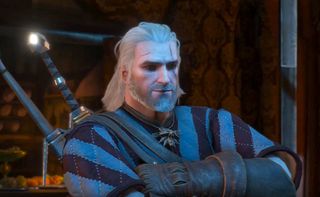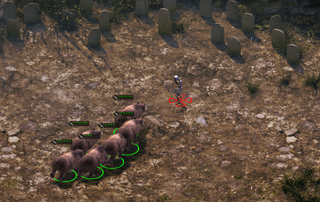How to be a better roleplayer
Experts discuss why we roleplay, and how to have more fun doing it.

A team of four researchers at North Carolina University once wrote a paper with this impressively lofty title: “The Mimesis Effect: The Effect of Roles on Player Choice in Interactive Narrative Role-Playing Games”. Despite sounding like a PhD thesis so dry you could use it for kindling, the study itself is actually pretty straightforward. They examined how players made decisions in a simple roleplaying game of their own design, a sort of fantasy choose-your-own-adventure with visuals straight out of an old school Zelda.
They came to the conclusion that “participants role-play even if not instructed to, exhibiting a preference for actions consistent with their role.” When games give us options about how to portray a character, we try to make that portrayal cohesive. Thief players chose sneaky solutions to problems while warrior players tended to be more direct.
Everybody roleplays in games that let us. We just don’t always realize we’re doing it.
Recognizing chances to roleplay and taking advantages of them is a way to enjoy games more, but it's a skill that takes sharpening. Players with a background in tabletop roleplaying games tend to be more aware of and deliberate about their roleplaying, so I asked three professional RPG designers about the crossover between pen-and-paper roleplaying and videogames. Jeremy Crawford, one of the lead designers of Dungeons & Dragons 5th edition and codesigner of the Blue Rose RPG, says, “Any time a videogame lets me create my own character, I can’t help but slip into a D&D mindset about the character creation process: ‘What are my character’s goals, beliefs, personality quirks, greatest loves, and deepest hates?’ It’s hard for me not to ask questions like that.”
Making the MMOst
Mike Mearls, who also helped design the 5th edition of D&D, agrees. “I definitely engage in roleplaying in any game where I know those choices will lead me down different paths.” Though he mentions re-playing games like Mass Effect as different characters who make different choices, there are limits on how far from himself those characters are. “I have to admit, though, it’s hard for me to stray too far down the evil path. In Knights Of The Old Republic, I liked my companions too much to follow through on going full evil.”
You might expect tabletop roleplayers to gravitate to the kinds of online games where they can interact with other players in-character, approximating what it’s like to play D&D around a table via World of WarCraft or other MMOs. For the RPG designers I’ve spoken to, that’s not really the case. Grant Howitt, who self-publishes games like Goblin Quest and Honey Heist, says that MMOs can never really replicate what he gets from playing with friends in person.

“It’s so hard to read people’s intentions through text, it’s really hard to replace that face-to-face. So much of language and making a scene together and making something an interesting situation is body language and glancing and how to read people. Even over Skype you lose that, even over video. You don’t know when to pause, you don’t know when to interrupt, you don’t know how to keep the thing flowing.”
The biggest gaming news, reviews and hardware deals
Keep up to date with the most important stories and the best deals, as picked by the PC Gamer team.
By comparison, Jeremy has done “a fair amount” of roleplaying in MMOs, but it hasn’t always gone well. “When WoW first came out, my husband and I, along with a few of our friends, innocently thought it was a game for roleplaying,” he says, “so we roleplayed—on a non-RP server! I still laugh when I remember us earnestly talking in character in Goldshire and someone yelling, ‘We’re being invaded by RPers!’”
“I generally don’t enjoy playing online with strangers, it’s just the odds of them being an absolute dickhead are pretty high compared to my chums,” explains Grant, “so I’ll generally just roll with people I know. In Grand Theft Auto we did roleplay, me and a friend became a pair of lesbian stock traders and then my character got a haircut and was like, ‘How about if we rob banks?’ So my chum’s character was just being dragged along on all these heists complaining the whole time. ‘I used to be a stockbroker, I don’t know what I’m doing!’ That was really funny, it’s nice to be able to play in an improv space.”

Teaching yourself to roleplay
Turning the roleplaying you do subconsciously into a deliberate act makes all the difference. Games give us open worlds and branching stories and allow for alternate playstyles, and when you fully inhabit a role those things stop seeming like items on a checklist. They become tools for expressing yourself.
It may seem ironic, but it’s often easiest to get into a role in a singleplayer game where you don’t have to take other players and their unpredictable actions and expectations into account. There, like the test subjects in that North Carolina University experiment, you’re free to create an identity of your own, whether by designing someone from scratch and spending hours contouring their face, or choosing whether to play as pragmatic Geralt, vicious Geralt, or rough-exterior/soft-interior Geralt.
Turning the roleplaying you do subconsciously into a deliberate act makes all the difference.
It’s easy to fall into a trap of putting yourself into a straitjacket with that initial choice. Plenty of people decide at the start of Mass Effect whether they’re going to play as a Paragon or a Renegade and then simply click on the appropriately colored options in every conversation and moral test across the entire trilogy, turning tests of character into tests of whether you can tell red from blue. It’s more satisfying to weigh the options and consider what your version of Commander Shephard would do, case by case, and as soon as you do that, you’re roleplaying. Maybe your Shephard is a stickler for doing things by the book, but there’s no way she’s going to pass up the opportunity to headbutt that krogan.
Being free to let your character surprise you is one of the great joys of roleplaying. I’ve found myself being less mercenary to impress a companion and then realizing I preferred being generous, switching from the dark side to the light, and even having a sex change in the middle of Saints Row: The Third because my version of the Boss didn’t feel right as a man. (Turns out she was a Russian woman all along.)

These may not be the best choices, mechanically speaking, but they pas off in other ways. When I realized my Jedi in Knights of the Old Republic 2 couldn’t go through with all the petty destructive things you have to do to stay on the dark side it let me play through a redemption arc more satisfying than it would have been to simply optimize my light side points from the start of the game.
Games train us to think this is the wrong way to play them, but it’s liberating. “If you ever take something which is not the optimal route you’ve started roleplaying rather than just playing a game,” Grant says. Whether you choose to give half your money to the poor or refuse to kill, those choices enrich and personalize your experience. And they don’t necessarily need to be nice choices, as Grant found when he played Deus Ex: Human Revolution.
“[At first] I played through completely by numbers, playing a good guy, I would only try to kill people if they tried to kill me first to the point where I’d render people unconscious then shoot them. It seemed professional, in a John Wick way. But I grew bored with this, re-rolled, started again. There’s this bit in the early level in Detroit where you’re hanging out in the back alley and these guys are like, ‘These augs, they’re horrible bastards. I hear they kill people.’ ‘I hear this aug went mad and ate a helicopter!’ It’s ridiculous bullshit, so I’m like, ‘I’m gonna be that aug.’ I went into every situation with the sole idea I would set it up so the murder investigator would throw up. I’d leave one guy at the bottom of six corpses or grab a vending machine and kill everyone using only one vending machine. I wasn’t proud to play it in front of my wife because she’d ask what I was doing. ‘I’m just putting this half-conscious man in an air vent so he’ll choke to death.’ It was quite cathartic.”

I’m just putting this half-conscious man in an air vent so he’ll choke to death.
The first part of that story, in which Grant takes Deus Ex: Human Revolution for a spin as a more typical character, is a common beginning. While sometimes the events of a game may trigger a change of heart in your version of the protagonist, at other times they render you nonsensical. As open as modern games tend to be there are still limits to them, and it’s easy to find yourself either bored by coloring within the lines or frustrated by the ways you butt against them in your attempts to do things differently.
“I think definitely the first time I play it I just go with whatever feels right,” says Grant, “because I’m still finding and testing the limits of the game and also the morality system or the crime system, and also how I feel the world deserves to be treated or warrants if it’s a very realistic game. Like for instance in Grand Theft Auto V I hate running people over. Also, at least two of the characters aren’t the sort of men who run people over. It feels quite brutal and unnecessary.”
Taking things in a more personal direction provides a good impetus to replay a game. “Generally the second time I play through something I’ll be like ‘All right, let’s try something out’ and I’ll try being a good guy or I’ll go non-lethal or whatever, but my nonlethal runs generally last three, four minutes, then I realize how difficult it is.”

Playing a role that makes things difficult, or is explicitly not what the designers intended, can improve a game, or at least our experience of it. PC Gamer’s own Chris Livingston has proven as much in the game diaries where he plays Oblivion and Skyrim by pretending to be a non-player character, an ordinary goober with no heroic qualities who runs screaming in the other direction as soon as anyone offers him anything as dangerous as an actual quest.
He scrapes by collecting herbs and hunting animals to sell, spending much of his money on food and renting a bed at an inn, and barely survives being attacked by bandits. He even walks everywhere unless he’s got a good reason not to, disdaining not just the fast-travel, but even the impatient player’s tendency to sprint everywhere.
The anecdotes that come from this kind of roleplaying often outdo anything you get from sticking to the script and following the main questline (especially in Oblivion, that main questline, oof), and the internet is full of game diaries and let’s play videos in which inventive players find ways to inject new personality into the spaces games delineate for us.
And yet, often there are comments underneath saying things like “I could never play like this” or “I don’t have the imagination to do this”. But roleplaying is a skill anyone can learn, even though tutorials don’t teach it. If teenagers can pick up Dungeons & Dragons or any other tabletop RPG and learn how to pretend to be someone they’re not, so can you.
“It is definitely a skill!” Mike confirms. “Roleplaying is essentially a subset of acting, and you can trace careers and see people improve in movies all the time.” The best way to learn that skill is by doing it. I don’t mean you need to become an actor and start landing some movie roles. I mean you should find some friendly people and try out a tabletop RPG. It’s easier than you think, and you can bring the things you learn back to videogame land.

Jody's first computer was a Commodore 64, so he remembers having to use a code wheel to play Pool of Radiance. A former music journalist who interviewed everyone from Giorgio Moroder to Trent Reznor, Jody also co-hosted Australia's first radio show about videogames, Zed Games. He's written for Rock Paper Shotgun, The Big Issue, GamesRadar, Zam, Glixel, Five Out of Ten Magazine, and Playboy.com, whose cheques with the bunny logo made for fun conversations at the bank. Jody's first article for PC Gamer was about the audio of Alien Isolation, published in 2015, and since then he's written about why Silent Hill belongs on PC, why Recettear: An Item Shop's Tale is the best fantasy shopkeeper tycoon game, and how weird Lost Ark can get. Jody edited PC Gamer Indie from 2017 to 2018, and he eventually lived up to his promise to play every Warhammer videogame.
Most Popular

